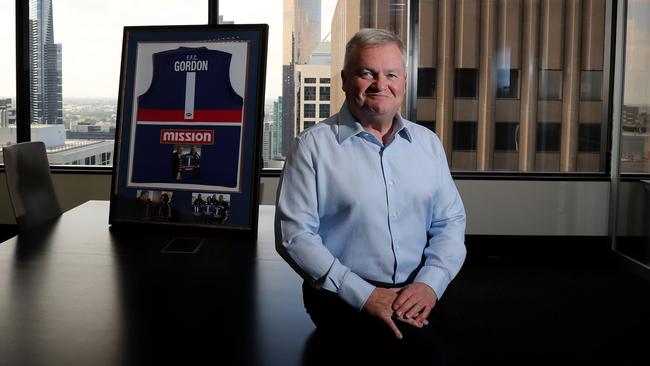Statutory limits a weapon of the rich, says Bulldogs’ Peter Gordon
Peter Gordon is taking on the two titans of his industry, his former firm, Slater & Gordon, and rival Maurice Blackburn.

Statutory limits on the amount of money law firms and litigation funders can take from large settlements could become a “weapon for very well-heeled defendants” to exhaust plaintiffs’ resources, one of the nation’s leading class action lawyers has warned.
Gordon Legal head Peter Gordon — who has today been awarded one of the nation’s highest honours, the Member of the Order of Australia — is opposed to the potential reform, which is being examined as part of the Australian Law Reform Commission’s inquiry into the financing of class actions.
Mr Gordon spent almost 30 years at Slater & Gordon and is also president of AFL club Western Bulldogs. He has been recognised in the Australia Day honours for his services to football, health promotion, youth social welfare and the law.
The 60-year-old will now take on the two titans of his industry, his former firm, Slaters, and rival Maurice Blackburn, with plans to grow his 20-lawyer firm into a “full-service labour law firm”.
“There’s been a bit of unrest in the plaintiff law field in the last couple of years and some dislocation and I think there’s a real need for a new opportunity for young lawyers who want to make a difference and achieve some social justice ends and I want to provide them with that opportunity,” Mr Gordon told The Australian.
He said he had been contacted by lawyers from a “number of the labour law firms” seeking to join Gordon Legal and had run successful cases in the past in Western Australia, Queensland and NSW.
“One of the challenges for us is to regulate our growth because it’s an exciting time and there are a lot of opportunities,” he said. “We need to make sure that we move in a measured way to avoid some of the pitfalls that growing too fast can bring about.”
Mr Gordon, who has achieved historic payouts for thalidomide survivors, asbestos victims and child abuse survivors, among others, is a staunch defender of the role of class actions and litigation funding in delivering access to justice.
Even those who had written opinion pieces on the topic “in support of their corporate clientele”, he said, “would acknowledge that to an overwhelming degree, the availability of litigation funding has been a force for good”.
“In the shareholder class action area, it really has sharpened the focus of directors on continuous disclosure and proper standards of corporate governance,” he said.
“And to the extent it has been available for very large cases like the (Black Saturday) bushfire case, it really has provided … an opportunity for people who lost their homes and their livelihoods who otherwise wouldn’t have been able to find a lawyer who could spend hundreds of millions of dollars to get a case up, with the opportunity to get justice.”
However, some of the bushfire victims were angered when it emerged Maurice Blackburn had taken $100 million in fees from the $494m settlement.
Mr Gordon said any potential reforms were unlikely to make much practical difference in a sector that already had checks in place, such as court scrutiny of the fees charged in class actions. He said if a cap were to be imposed on the fees lawyers charged, it could be used as a weapon for defendants with deep pockets, like Big Tobacco.
“If they know by simply litigating every procedural point and taking every point of appeal they will eventually get to a point where the lawyers on the other side aren’t allowed to charge any more because of the cap, I don’t have any doubt they would exploit that to their advantage and not necessarily in the most appropriate way,” he said.
A few years ago, Mr Gordon was working full-time at the Western Bulldogs, helping to turn the club’s fortunes around. It is now net debt free for the first time in more than 50 years and has broken its 62-year AFL premiership drought. He said it was a “good time to be associated with the Bulldogs”, but he does not claim personal credit.
He has since scaled back his involvement to a “more traditional governance role” and has also vowed to divest himself of his personal holding in CLF, a litigation funding company.
“I want to devote the next phase of my life to the Gordon Legal side of things and I don’t want the complications that would arise from any suggestion of a conflict,” he said.



To join the conversation, please log in. Don't have an account? Register
Join the conversation, you are commenting as Logout